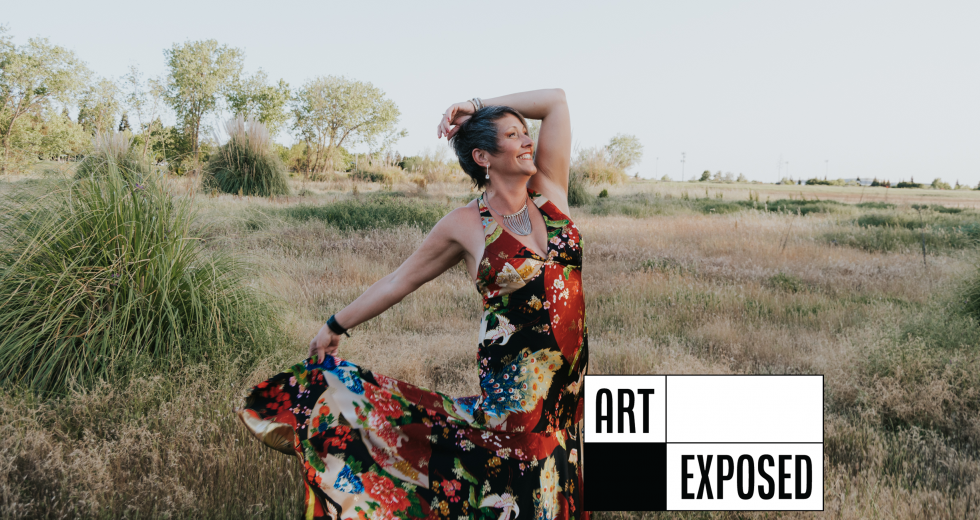Carrie Hennessey has been known to belt out a tune while walking her dogs outside of her South Natomas home, but the neighbors in this otherwise quiet neighborhood don’t seem to mind. She picked up the moniker “Opera Mom” while her two children (now in their 20s) were in elementary school, but there is a lot more to her. Hennessey, in addition to singing, continues to establish herself in Central California’s performing arts scene as an actor, producer, director and instructor.
Raised in Minneapolis, the youngest of eight children, Hennessey absorbed her mother’s passion for music from infancy. Her mother, an accompanist for vocal groups, would pedal the piano with one foot and rock baby Carrie with the other. Hennessey began singing in childhood and, along with participating in athletics and student government, continued her musical passion at the University of Minnesota, Morris.
While in her early 20s, she shelved singing for personal reasons. Twelve years later, Hennessey returned to express her love for music through teaching as well as performing. She takes a holistic approach to her vocal instruction, asserting that it’s more than just hitting the high notes. Hennessey works with her students to attain an improved overall state of well-being, using the voice as a vehicle. She proclaims that there’s a singer in anybody who is open to receiving proper guidance.
Hennessey moved to California in 2008 when her husband’s career in the telecom industry brought the couple here, along with an opportunity to work with Berkeley Repertory Theatre. She has since made her mark in the area, singing with the Sacramento Opera, in collaboration with the Sacramento Ballet, Sacramento Children’s Chorus, and Chamber Music Society of Sacramento. While here, she has branched out to partake in independent endeavors, including the Rogue Music Project and The ReAssemblers of Whimsy. Hennessey has also shared her talents throughout the United States and Europe, including performances in New York City, Texas, Colorado, Germany, Belgium, the Czech Republic, Hungary and Austria.
When did you discover your gift for singing?
There was a lot of music around as I was growing up. My mom played for church choirs, a woman’s singing group and a mothers’ singing group. They would go to retirement homes, dementia facilities and recovery homes and perform. I was the little 5-year-old that was at this adult choir. I picked up and memorized all the music and harmonized. I was always very emotional, and singing helped move me through emotions that I was having.
How do you balance your career and family life?
It’s tricky, and it changes all the time. My kids are grown; it’s a little bit easier. When they were little it was making sure that we built community very quickly with other people that they went to school with, and we would all take turns and help out as much as we could. We got a lot of help from other families, such as, “Can you watch them for a couple hours? I gotta drive to San Jose, and I’m not going to be back in time to pick them up from school.” Everybody was really there for each other.
That sense of community also seems to be very much a part of your life in an artistic sense.
Yeah, and also really wanting to tell stories in a place that I’m spending a lot of my time, with the people whom I’m spending time. So I’ve kind of stopped doing that outside of California. I was traveling all over the world, all over the country, and I thought I would like to enrich my town. I want to bring things to my area. So even after my kids have graduated from a performing arts charter school, I’ve always done an opera talk for the sixth graders.
Your career, including your community service, is so multi-faceted. Is it hard to pick and choose a direction?
I feel like the direction sort of chooses me when I’m listening. And for me, all of those things, it’s really important to be utilizing all of my skill set at all times. And sort of, the percentages change, depending on what feels more important. In this moment I’m sort of backing off some of the performance stuff because it feels really important for me to do not just my vocal studio teaching, but to step more into the mentor role and let the young ones sing those things. I’m also creating a series of workshops with a licensed therapist because the work that I do in the studio with people is very trauma informed, really working with the whole artist as a vocal modality. So I get them there and we focus on that stuff, but I don’t leave behind how we can tangibly work through things like anxiety and fear.
How many years have you been doing this type of work in your musical teaching?
From the beginning, because I came back from my 12-year break after a trauma. It’s really clear to me that I teach very differently because I’m dealing with that and working through all of that, and understanding how much of our voice is so informed by our emotional status and to grant grace around that. Because I think that perfectionism thing with singers — if we don’t get it perfect and we’re on the whipping post for what wasn’t right — what happens is our body tenses up, and it gets worse. The singing gets worse and worse because there’s literally no room to breathe.
Opera has been called a blood sport.
And it is; you have to go full throttle all the time. The expectations are crazy.
Do you lose some of that joy of performance when you’re singing a role in classic opera?
I guess I really benefited from not being in the business for 12 years. So when I started getting roles out of nowhere, I came back, and I didn’t feel like I was vocally ready to, like, hop on the stage. But the hiring people did. And they started hiring me immediately. I guess I came in with such vim and vigor for the process. I’m such a process-oriented human. Result is kind of my secondary thing.
Is classical your most enjoyable genre to sing?
I like to sing good music. And growing up in Minnesota, the sort of thing that was taught there, in the theater world especially, is make sure you have a variety of skill sets. So if you’re a Shakespearean actor, you also take opera lessons. You also take movement. You also make sure you can do a lot of different things. And I also take great joy in singing everything.
Do you personally have a conditioning program to keep your voice fit?
I meditate daily. I yoga. I walk. I do strength training. I go to a community breath class which does very much a release of things, it helps out with everything. I’m really clear about listening to my body about what I eat. Making sure I’m paying attention, especially on show days, rehearsal days, that I got enough fuel to get me through, because if I am not fed correctly I get off my breath, and I’m not grounded, so it makes it really hard to sing well,and then I strain.
You performed across the globe. Do you have a favorite location?
I really loved singing in Prague. Yeah, the Dvorak Hall and singing the Dvorak Requiem with an orchestra there was sort of otherworldly. I love that town.
As an artist and instructor, you must be rejoicing, being able to be around people again after the pandemic.
Oh my gosh. Yeah. The screen. That was my setup. During the pandemic I was really providing a lot of care for these singers that had no place to put their real selves.
Will you tell me about your upcoming one-woman show?
Yeah, it’s not done yet because I started working on this workshop series; but yeah, I’ve been working on putting it all together, and I have it pretty much all written. It’s based on my life and me coming back to singing after the trauma and what that looks like and how it all kind of came to be. The show is sparked by my inspiration from my mother and sort of bookended by the work I am doing, sort of similarly with music and healing and sort of how we got there because this thing happened to me and in some ways for me, so that I could keep that lineage of healing through music and voice alive and well in my own way.
Edited for length and clarity.
–
Stay up to date on art and culture in the Capital Region: Follow @comstocksmag on Instagram!
Recommended For You
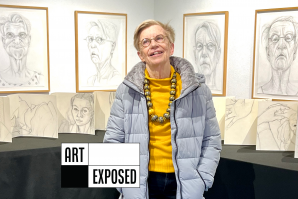
Art Exposed: Betty Nelsen
On the art of how to look in the mirror
In revisiting her early self-portraits, Betty Nelsen has zeroed in on the strongest elements, cropping the drawings into pages that will go into a series of handmade books.
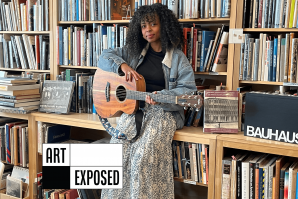
Art Exposed: Beti Masenqo
The musician-singer-songwriter blends folk and rock with the Ethiopian songs of her childhood
When she performs, singer and songwriter Beti Masenqo leaves this earthly plane in a way that seems entirely effortless.
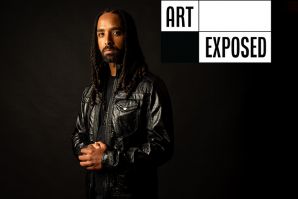
Art Exposed: Unity Lewis
A curator, artist and musician carries the legacy of his grandmother’s groundbreaking work documenting the Black experience
Unity Lewis recently curated a series at Crocker Art Museum that brought his grandmother’s book into the three-dimensional world by pairing works of artists from previous generations with their modern counterparts who will carry the torch.
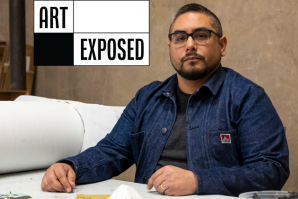
Art Exposed: Vincent Pacheco
A graphic artist blurs art and design and plays with the cultural language of piñatas
The artist builds piñatas in various forms of cultural artifacts. Each is a temporary monument to family, identity and cultural heritage.
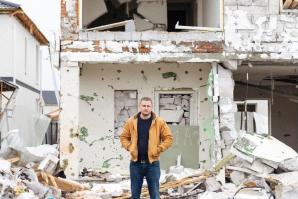
Art Exposed: Alina Tyulyu
A lifestyle photographer becomes a war documentarian when she returns to Ukraine as a volunteer
The Sacramento-based photographer is traveling around her
native country of Ukraine to aid refugees during the
Russia-Ukraine war, documenting their experiences along the
way.
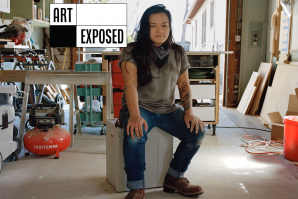
Art Exposed: Nancy Sayavong
The Roseville-based sculptor uses woodworking techniques for both art and remodeling
As a woodworker and metal fabricator, Nancy Sayavong uses her
training both for art and remodeling jobs. Her work is
interested in the contrast between the romantic ideal of the
home and its lived reality.



